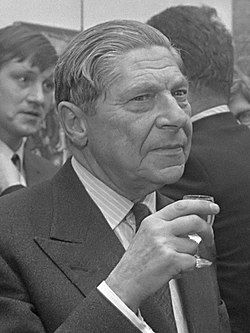Arthur Koestler Quote
Related Quotes
Attempts to locate oneself within history are as natural, and as absurd, as attempts to locate oneself within astronomy. On the day that I was born, 13 April 1949, nineteen senior Nazi officials were...
Christopher Hitchens
Tags:
alcohol, alcoholism, andrei gromyko, antisemitism, astrology, astronomy, beijing, birth, birthdays, breastfeeding
Empowered Women 101: The moment you ignore bad behavior, in order to win a person's affection you have not won anything, but a person that has behavioral problems. If you couldn't fix their behavior b...
Shannon L. Alder
Tags:
bad behavior, behavior problems, blinded, history, ignore, issues, men, overlook, stayingpositiveu com
About Arthur Koestler
Arthur Koestler (UK: , US: ; German: [ˈkœstlɐ]; Hungarian: Kösztler Artúr; 5 September 1905 – 1 March 1983) was an Austro-Hungarian-born author and journalist. Koestler was born in Budapest, and was educated in Austria, apart from his early school years. In 1931, Koestler joined the Communist Party of Germany but resigned in 1938 after becoming disillusioned with Stalinism.
Having moved to Britain in 1940, Koestler published his novel Darkness at Noon, an anti-totalitarian work that gained him international fame. Over the next 43 years, Koestler espoused many political causes and wrote novels, memoirs, biographies, and numerous essays. In 1949, Koestler began secretly working with a British Cold War anti-communist propaganda department known as the Information Research Department (IRD), which would republish and distribute many of his works, and also fund his activities. In 1968, he was awarded the Sonning Prize "for [his] outstanding contribution to European culture". In 1972, he was made a Commander of the Order of the British Empire (CBE).
In 1976, Koestler was diagnosed with Parkinson's disease and in 1979 with terminal leukaemia. On 1 March 1983, Koestler and his wife Cynthia died of suicide together at their London home by swallowing lethal quantities of barbiturate-based Tuinal capsules.
Having moved to Britain in 1940, Koestler published his novel Darkness at Noon, an anti-totalitarian work that gained him international fame. Over the next 43 years, Koestler espoused many political causes and wrote novels, memoirs, biographies, and numerous essays. In 1949, Koestler began secretly working with a British Cold War anti-communist propaganda department known as the Information Research Department (IRD), which would republish and distribute many of his works, and also fund his activities. In 1968, he was awarded the Sonning Prize "for [his] outstanding contribution to European culture". In 1972, he was made a Commander of the Order of the British Empire (CBE).
In 1976, Koestler was diagnosed with Parkinson's disease and in 1979 with terminal leukaemia. On 1 March 1983, Koestler and his wife Cynthia died of suicide together at their London home by swallowing lethal quantities of barbiturate-based Tuinal capsules.
